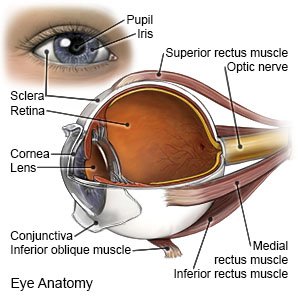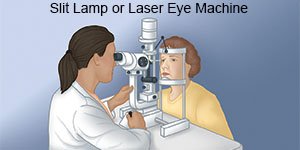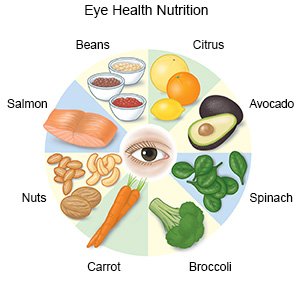Retinal Hemorrhage
Medically reviewed by Drugs.com. Last updated on Aug 4, 2025.
What is retinal hemorrhage?
Retinal hemorrhage is bleeding from the blood vessels in the retina, inside your eye. Your retina is the thin layer that lines the back of your eye.
 |
What causes retinal hemorrhage?
- Medical conditions, such as diabetes, high blood pressure, anemia, or leukemia
- Eye problems, such as macular degeneration, or a bulging of the blood vessels in the retina
- Head trauma caused by car accidents, or child abuse
- Rapid change in air pressure, such as in mountain climbing, or scuba diving
What are the signs and symptoms of retinal hemorrhage?
You may have no symptoms. You may have a sudden or gradual loss of vision, ranging from mild to severe. You may have blind spots.
How is retinal hemorrhage diagnosed?
- Blood tests may show information about your overall health. They may also show if you have a medical condition that caused your retinal hemorrhage.
- Vision tests may be done to check how well you see straight ahead, off to the sides, and at different distances.
- Fluorescein angiography may be used to take a picture of the inside of your eye. This test uses a dye that is injected into a vein in your hand or arm. The dye flows into the blood vessels of your retina, so your healthcare provider can see it clearly.
- Ultrasound may be used to show the bleeding inside your eye. Ultrasound uses sound waves to show pictures on a monitor.
How is retinal hemorrhage treated?
You may not need treatment, because a retinal hemorrhage often heals by itself. If your bleeding is caused by a medical condition, your healthcare provider will treat that illness. You may need any of the following:
- Steroid medicine may be given if you have macular degeneration.
- Laser treatment may be used to stop the bleeding.

What can I do to protect my vision?
Your healthcare provider will tell you when it is okay to do your regular activities if you receive treatment. He or she will tell you if you need to change or stop any activity that may damage your retina. The following can help you build and keep eye health:
- Manage health conditions that can cause vision problems. Common examples include diabetes, high blood pressure, and high cholesterol. Follow up with healthcare providers who manage these conditions.
- Wear sunglasses with ultraviolet (UV) light protection. UV light from the sun can damage your eyes. It can increase your risk for vision loss.
- Eat foods that contain eye-healthy nutrients. Healthy nutrients include vitamin A, vitamin C, vitamin E, omega-3 fatty acids, lutein, and zeaxanthin. They can be found in foods such as spinach, peanuts, salmon, collard greens, avocados, squash, eggs, and blueberries. Ask your healthcare provider for a full list of foods that contain eye-healthy nutrients. You may also need to take a vitamin or supplement to help you get enough of these nutrients.

- Exercise as directed. Ask your healthcare provider about the best exercise plan for you.

- Do not smoke. Nicotine can damage blood vessels in your eyes. Do not use e-cigarettes or smokeless tobacco in place of cigarettes or to help you quit. They still contain nicotine. Ask your healthcare provider for information if you currently smoke and need help to quit.
When should I seek immediate care?
- You cannot see, or your vision is greatly reduced.
When should I call my doctor?
- Your vision does not improve.
- You develop new vision problems, such as a lazy eye, or blind spots.
- You have questions or concerns about your condition or care.
Care Agreement
You have the right to help plan your care. Learn about your health condition and how it may be treated. Discuss treatment options with your healthcare providers to decide what care you want to receive. You always have the right to refuse treatment. The above information is an educational aid only. It is not intended as medical advice for individual conditions or treatments. Talk to your doctor, nurse or pharmacist before following any medical regimen to see if it is safe and effective for you.© Copyright Merative 2025 Information is for End User's use only and may not be sold, redistributed or otherwise used for commercial purposes.
Further information
Always consult your healthcare provider to ensure the information displayed on this page applies to your personal circumstances.
